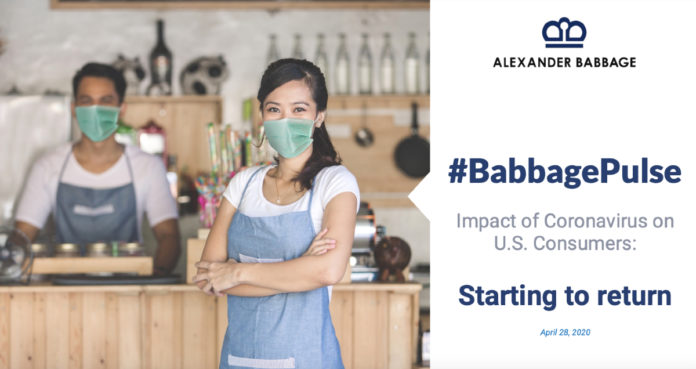A recent report, the Babbage Pulse, found that Americans are most interested in going to restaurants again when it’s safe. The Babbage Pulse is a bi-weekly report that is tracking ongoing consumer behaviors, activities, and attitudes during COVID-19. It was developed by Alexander Babbage, one of the nation’s leading research firms. In the report, 63% of Americans believe that shelter-in-place orders are still necessary while only 3% believe that that they are not necessary. However, 56% of respondents are most looking forward to going to a restaurant with their family. The next largest category was 43% looking forward to going to a grocery store that is properly stocked.
“Our findings indicate that, while people are most interested in going to restaurants again, they also do not want to go out too early,” stated said Alan McKeon, president, and CEO of Alexander Babbage.
McKeon also reiterated some of the “new normal” that restaurants will operate under. Executive chef and co-founder of Silver Diner restaurants Ype Von Hengst further explained how his 19 restaurants would likely operate when open. Silver Diner is a 31-year-old, fast-casual, farm-to-table chain in the Mid-Atlantic that has enjoyed huge success, prior to COVID-19.
“I believe these new practices are here to stay,” Von Hengst explained. “In many ways, it will be harder to reopen than opening a new restaurant.” He went on to talk about rearranging restaurant layouts and ensuring that the restaurants would be only 45-50% full. Guests would be seated at every other table or booth so as to maintain a safe distance. Signage will encourage guests to stay at least six feet apart from other guests. And, customers’ temperatures may be checked upon entry.
“Large parties will have to be split up,” Von Hengst added. Fortunately, some of Von Hengst’s restaurants have outdoor patios which he predicts will be very popular. “Social distancing will still be maintained outdoors,” he said. “We will also have fewer menu offerings due to a lower volume of customers and to ensure that the product remains high quality.” He continued, “There will be staff that don’t come back. We have a great family culture but, despite this, we know that we will lose people to other industries. Training new people is easier with shorter menus.”
Other changes include:
- Continuing daily temperature checks on all restaurant associates
- Disposable menus that are discarded after each guest
- Silverware that is sanitized and sealed
- Employees who are assigned to constantly wipe down high-contact surfaces
- Hand sanitizer located throughout the restaurant
- Employees wearing masks and gloves
- Separate entrances and/or curbside pickup remains for takeout guests
- Bar seating will be removed and reconfigured to allow 6 feet between bar stools
- Bar servers will take orders and deliver drinks and food but will not linger across from guests
- Overnight cleaning crews that are more rigorous and thorough
COVID-19 has led to so many challenges. “Rent structures for restaurants need to be reviewed by landlords,” Von Hengst cautioned. “Better to have a win/win deal with your current tenant than trying to make a new deal with nobody.”
The closure of restaurants has forced Von Hengst and his team to be creative. All of Von Hengst’s restaurants are open for takeout and, while takeout was about 15% of the restaurants’ total business pre-COVID-19, Von Hengst believes that it will be a much larger percentage following COVID-19. “We believe that many of our new takeout customers will continue this practice and provide 30-35% of our ongoing revenue,” Von Hengst said. With a large brunch following, the restaurants offer Brunch in a Box and mimosa kits as well as other boxes and kits. Special boxes have been created for holidays including Easter and Mother’s Day.
In order to help out the farms that Silver Diner typically orders from (in large volume), Von Hengst also created Farm Boxes and is selling more than 1,200 boxes a week as pre-order and in-store or curbside pickup. “When we re-open the restaurants, we may continue to sell these boxes of fresh produce, eggs, milk, and even meat,” said Von Hengst. “It may well be one of the great things that comes out of this and, in turn, helps farmers recover.” In many areas, Farm Boxes are sold as grocery stores struggle to maintain produce and products including meat. Plus, the ease of curbside pickup and the availability of Farm Boxes three days per week at every restaurant is a huge convenience.
The Babbage Pulse will continue to track consumers as restaurants and other businesses begin to open up in various sections of the country.
Alexander Babbage is a full-service location-based analytics and insights firm focused on physical locations where consumers go to eat, shop, play, and be entertained. The firm used survey data for the Babbage Pulse as well as its own TruTrade® Analysis, an anonymous mobile device tracking and analysis platform. Through the use of this tool, Alexander Babbage can accurately quantify a vast set of metrics for North American destinations including observing traffic, visit duration, distance traveled, demographics, and more.
For more information, visit alexanderbabbage.com. A summary of the report is available here.














